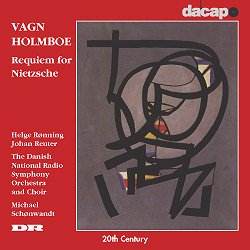After Carl Nielsen, Vagn Holmboe is Denmark’s best known composer,
having written a very large body of works (almost 400) and concentrating
on orchestral, chamber and choral music.
I first came across Holmboe in the late seventies,
in a Radio Three series of "Symphonies of the North". My first
purchase was the Symphony No.8 on a Turnabout LP with Jerzy Semkow conducting
the Royal Danish Orchestra. This was immediately striking and interesting
music, and I have acquired many more of Holmboe’s works as they have
gradually become more available (the series on BIS is a good example).
This disc is the first of Holmboe’s choral works which
I have encountered, and I have been extremely impressed with it.
Dacapo has been releasing other works by the composer,
not generally available on other labels, a recent example of which is
a pair of discs of the Preludes for Orchestra, both of which have been
very well received. With a total of 400 to go for, there is no excuse
for extensive duplication, and the current release is to be accepted
with rejoicing.
His Requiem for Nietzsche was written in 1964 over
a two year period as a direct result of working with a Danish poet (Bjornvig)
on a choral cantata for the University of Aarhus in 1959. The text for
this had been written by Bjornvig, and during the production, the two
men realised that they had much in common, attitudes, outlooks, sense
of humour etc. Bjornvig had at this time also written a series of 11
sonnets based upon the life of the German philosopher Nietzsche. These
sonnets conjure up a representation of the philosopher’s life, not a
blow by blow of what and when he did it, but a representation of his
outwardly appreciated feelings and reactions to circumstances.
Holmboe set his Requiem to the texts of the Sonnets
and the outcome is a superb choral work, which deserves a wide circulation
among music lovers. When we have so much duplication of the standard
classics, plus issues of incomprehensible bang crash and shimmer, it
makes a refreshing change to welcome a work like this.
It is set in five main sections and is in some ways
the most advanced work so far that has been released. Most of Holmboe’s
output has been clearly tonal, and this work uses examples of more modern
techniques such as whispering, speaking and shouting, all used to great
effect. It does not however, leave the tonal territory behind, and so
the fusion of the different techniques is used to the effect of the
music, rather than for its own sake.
The soloists are first rate, and although I do not
understand Danish, I am sure that by using home trained singers, the
language is much better served than perhaps by using more international
artists. There is no need to qualify the playing of the Danish National
Symphony Orchestra which is now provides a background as good as one
might be able to expect, ably supported by their superb chorus. The
whole is controlled extremely successfully by Michael Schønwandt
who has been making a very high reputation for himself over the past
five or so years in both this type of repertoire as well as the mainstream
catalogue.
John Phillips


